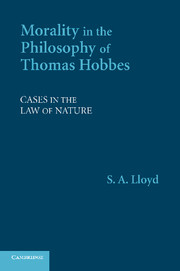Book contents
- Frontmatter
- Contents
- Preface
- Introduction
- PART ONE MORAL PHILOSOPHY, METHOD AND MATTER
- PART TWO FROM PSYCHOLOGY TO MORAL PHILOSOPHY
- 3 The Law of Nature: Definition and Function
- 4 A Critical Examination of Derivations of the Laws of Nature
- 5 The Reciprocity Interpretation of Hobbes's Moral Philosophy
- PART THREE FROM MORAL PHILOSOPHY TO CIVIL PHILOSOPHY
- Bibliography
- Index
4 - A Critical Examination of Derivations of the Laws of Nature
Published online by Cambridge University Press: 30 September 2009
- Frontmatter
- Contents
- Preface
- Introduction
- PART ONE MORAL PHILOSOPHY, METHOD AND MATTER
- PART TWO FROM PSYCHOLOGY TO MORAL PHILOSOPHY
- 3 The Law of Nature: Definition and Function
- 4 A Critical Examination of Derivations of the Laws of Nature
- 5 The Reciprocity Interpretation of Hobbes's Moral Philosophy
- PART THREE FROM MORAL PHILOSOPHY TO CIVIL PHILOSOPHY
- Bibliography
- Index
Summary
Reasoning is simply the joining together and linking of names.
(Third Set of Objections to Descartes's Meditations)Having now surveyed Hobbesian psychology and the casuistry, definition, and function of the Laws of Nature, we are well situated to consider various interpretive proposals as to how Hobbes derives these Laws of Nature as “theorems of reason”. An adequate account of their derivation will plausibly explain how the specific norms Hobbes identifies as Laws of Nature can be understood to be requirements of reason having the requisite normativity for complex Hobbesian agents, and how they can serve the role Hobbes assigns them in his political philosophy. Separating out these desiderata, an adequate interpretation will do the following:
Rely only on psychological assumptions that are true of complex Hobbesian agents (psychological fit)
Yield norms with the particular content Hobbes identifies in his own Laws of Nature, as well as all of the conclusions, or “cases in the Law of Nature” that Hobbes identifies as required or prohibited by the Laws of Nature (content)
Show how those norms are normative in the right way, that is, how they make potentially motivationally efficacious ought-claims that are universal and inescapable for Hobbesian agents (weakness of will notwithstanding) (normativity)
Be philosophically and practically plausible – that is, the account will not be irredeemably elliptical, extremely dubious, obviously false, or outlandish (plausibility) and importantly
[…]
- Type
- Chapter
- Information
- Morality in the Philosophy of Thomas HobbesCases in the Law of Nature, pp. 151 - 210Publisher: Cambridge University PressPrint publication year: 2009



